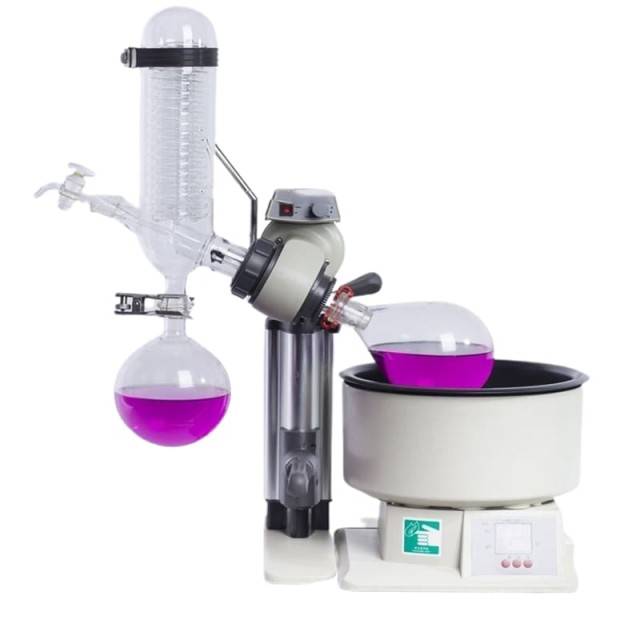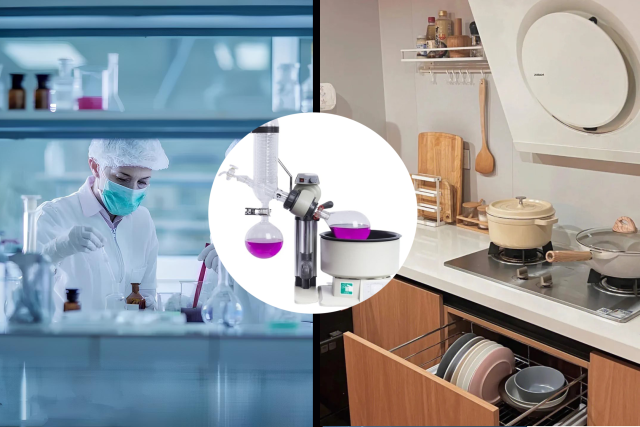Introduction to Rotary Evaporator
A rotary evaporator, also known as a rotovap, is a laboratory device used for separating solvents from samples using evaporation. The device consists of a rotating flask and a condenser that is cooled by either air or water. The sample is placed in the flask and heated, causing the solvent to evaporate and then condense in the cooled condenser. This process effectively separates the solvent from the sample, leaving behind a concentrated residue. The rotary evaporator is commonly used in chemistry, biology, and pharmaceutical research, as well as in the food industry for molecular cooking. Its ability to handle small sample sizes and low boiling-point solvents make it a valuable tool for laboratory applications.
Table of Contents
Lab Applications of Rotary Evaporator
A rotary evaporator is a versatile piece of equipment used in various applications in the laboratory. It is commonly used to concentrate and purify solutions by removing solvents through evaporation. Here are some of the laboratory applications of a rotary evaporator.

Extraction and Isolation of Compounds
The rotary evaporator is commonly used in chemistry and pharmaceuticals to extract and isolate compounds from complex mixtures. By using a rotary evaporator, it is easier to separate the target compound from other components in the sample. This is achieved by creating a vacuum that lowers the boiling point of the solvent, allowing it to evaporate at a lower temperature than usual. This process is gentle and allows for the separation of different components without damaging the sample.
Determination of Molecular Weight
The rotary evaporator is also used in the determination of molecular weight. This is done by evaporating a known volume of a solution containing the sample and measuring the mass of the residue. The mass of the residue is then used to calculate the molecular weight of the sample.
Purification of Solvents
In addition to extraction and isolation of compounds, the rotary evaporator is used to purify solvents. Solvents that have been used in chemical reactions or extractions may contain impurities, which can affect the outcome of subsequent experiments. The rotary evaporator removes the impurities by evaporating the solvent and leaving behind the impurities.
Production of Essential Oils and Fragrances
The rotary evaporator is also used in the production of essential oils and fragrances. By using a rotary evaporator, it is easier to extract the essential oils from plant material and purify them. This is achieved by evaporating the solvent used for extraction and leaving behind the essential oil.

Scale-up Processes
In addition to laboratory applications, the rotary evaporator is also used in scale-up processes. Large-scale production of chemicals or pharmaceuticals requires equipment that can handle large volumes of solvent. The rotary evaporator can be used to remove solvents from large volumes of samples, making it a valuable tool in scale-up processes.
In conclusion, the rotary evaporator is a versatile piece of equipment with various laboratory applications. It is commonly used to extract and isolate compounds, determine molecular weight, purify solvents, and produce essential oils and fragrances. It is also used in scale-up processes. The rotary evaporator is an essential tool for scientists and researchers in the chemistry, pharmaceuticals, and research fields.
Industrial Applications of Rotary Evaporator
Rotary evaporators have proven to be an invaluable tool for various industrial applications. With their ability to remove solvents quickly and efficiently while preserving the purity of the final product, they have become an essential tool for many industries. Here are some of the industrial applications of rotary evaporators:
Petrochemical Industry
In the petrochemical industry, rotary evaporators are used to purify crude oil and other petrochemicals. The process involves separating different components of crude oil and removing impurities. Rotary evaporators are particularly useful in this industry because they can handle large volumes of liquid, making the process more efficient.
Pharmaceutical Industry
In the pharmaceutical industry, rotary evaporators are used to produce high-quality pharmaceutical products. The process involves separating chemical solvents and creating several high-quality pharmaceutical products. With their precise temperature control, rotary evaporators can handle heat-sensitive compounds, making them an ideal tool for the pharmaceutical industry.
Food Industry
Rotary evaporators are becoming increasingly popular in the food industry, particularly in the creation of high-quality, flavorful extracts and concentrates. They are used to create everything from essential oils and flavorings to concentrated fruit juices and coffee extracts. With their ability to handle large volumes of liquid and their precise temperature control, rotary evaporators are an essential tool for chefs and food manufacturers.
Nanotechnology Industry
Rotary evaporators are also used in the creation of advanced materials such as graphene and other nanomaterials. The process involves separating solvents from liquids and creating a concentrated solution of the desired material. With their efficient solvent removal capabilities, rotary evaporators are an essential tool for the nanotechnology industry.
In conclusion, rotary evaporators are an indispensable tool for a wide range of industrial applications. They have proven to be a valuable asset in the petrochemical, pharmaceutical, food, and nanotechnology industries. With their ability to handle large volumes of liquid and precise temperature control, rotary evaporators have become a must-have tool for anyone looking to extract or purify valuable substances from chemical solutions.
Applications of Rotary Evaporator in Molecular Cooking
Rotary evaporators, also known as rotovaps, are versatile laboratory equipment used in various industries, including molecular cooking. Molecular cooking is a modern culinary trend that involves the use of scientific techniques to create unique flavors and textures.
Extraction of Flavors and Aromas
The rotary evaporator is used in molecular cooking to extract and distill flavors and aromas from various ingredients, including herbs, fruits, and vegetables. The rotovap works by evaporating solvents and leaving behind concentrated extracts, which can then be used in cooking. The extracted flavors and aromas can also be combined with other ingredients to create unique and complex flavors and textures.
Concentration of Food Mixtures
Rotary evaporator cooking involves the process of concentrating food mixtures by removing water. This is achieved through the evaporation and condensation process, which is made possible by the rotary evaporator's vacuum evaporation function. By removing water from the food mixture, the juice concentrated can possess a much better taste.
Separation of Food Components
The rotary evaporator is an ideal distillation apparatus different from other conventional distillation apparatus, as it is capable of separating food components from one another without affecting any of the food components. This makes it ideal and more popular for home cooking.

Usage in Coffee Making
The rotary evaporator also plays an important role in the process of making coffee. It uses coffee beans and/or coffee products (ground coffee powder, coffee extract or its concentrate) as raw materials. It can add food additives without adding other food raw materials. It is a solid beverage that has been processed. In the process of making coffee, a rotary evaporator can be used to concentrate coffee by removing water from it.
Advantages of Rotary Evaporator in Molecular Cooking
The versatility of the rotary evaporator in molecular cooking extends beyond extraction of flavors and aromas. The rotary evaporator is operated under vacuum condition, which efficiently lowers the boiling points of materials. The relatively low temperature can preserve the original taste of materials. The evaporation flask is rotated by a motor and heated by a water bath or oil bath, increasing the evaporation area and speed the distillation process. It keeps the mixture evenly mixed and heated. Furthermore, the whole process can be clearly observed so that any adjustment can be done in time due to a rotary evaporator is made of transparent glass.
In conclusion, the rotary evaporator is a valuable tool in molecular cooking because it allows chefs to create new and exciting dishes that were previously impossible. The versatility of the rotary evaporator extends beyond molecular cooking, and it is also used in the pharmaceutical, chemical, and biotech industries.
Conclusion: Versatility of Rotary Evaporator
In conclusion, the rotary evaporator is a versatile and valuable piece of laboratory equipment. It has a wide range of applications in both the lab and industrial settings, making it a crucial tool in the fields of chemistry, biology, and food science. With its ability to efficiently and effectively separate and purify compounds, the rotary evaporator has revolutionized many processes, and its versatility continues to be explored by researchers and chefs alike. Whether it's extracting essential oils, purifying solvents, or creating unique flavors and textures in molecular cuisine, the rotary evaporator has proven to be an indispensable tool.

